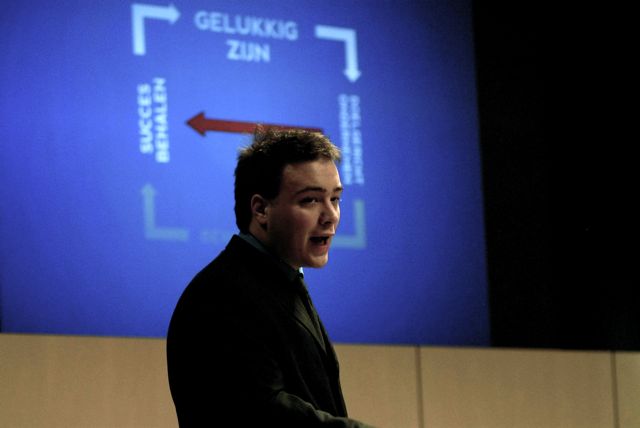Everyone thought Danny Mekić was crazy when he dropped out of high school. Now international corporations adapt their websites and digital strategies to his recommendations.
What was the essential message of your upbringing?
“I was very impressed by tales from my Bosnian grandfather. Before he fled the country to the Netherlands and moved in with us, he had been jailed in the former Yugoslavia due to his ethnicity. He lived in overcrowded cells and got a slice of bread and a bowl of soup a day. He very deliberately decided not to count the days. He started asking the other inmates for their life stories. He later told me he’d experienced moments of profound happiness during those conversations. It made me realise happiness isn’t about your circumstances, it’s about what you make of them.”
What qualities did you get from the environment you grew up in?
“I lived with my grandfather, father, mother and sister in a two room apartment. We didn’t have much money. My father was a radio technician and he got a computer from work when I was about ten years old. I felt strongly drawn to that device. When my father wasn’t home, I’d get behind it. Before long I was borrowing library books about programming. I remember well how I discovered by myself how to turn the colour of a tomato in a computer game from red to orange. That was a huge thrill.”
What technological development has played a major role in your life?
“The internet. My goal is to understand and explain the web as a whole. Once upon a time, it was just a way to transmit data. Then with the advent of websites, it turned into an information network. Later on, payment applications were invented and it turned into a sales platform. And now we’ve added a layer of social networks on top of it all. All those layers come together. That means that as an internet expert, you need to have a grasp of psychology, economy, technology and communication. Companies don’t want to hire a separate expert for every aspect any more.”
The best advice I was ever given
“Put up a large poster in your room with your age on it, so it’ll be the first thing you see when you wake up. That was a suggestion I got from Ben Verwaaijen, CEO of the French telecom company Alcatel-Lucent. Sometimes, with all my business contacts being a lot older than me, I forget how young I am myself. I have so much time left to accomplish what I want. I really could afford to have a beer some time, instead of just mineral water.”
What is your talent?
“I’m a consultant on technology, media and communication to 25 of the 100 largest organisations in the Netherlands. In doing what I do, I follow my gut feelings. When I advise a major bank, I often hear: we want the best bank website there is. But how do they approach that? They tell an intern to chart the websites of all European banks, and then they try to combine the best features of those. If everyone does that, nothing is ever going to change. I’m very bold in what I do. It’s happened before that I’d completely redesign the website of a quoted company without asking first, and then send them the bill with a smile.”
What was your most remarkable part time job?
“When I was fourteen and in high school, I got phone calls while I was in class. Phone calls from clients. I had a little internet company, building websites for companies and organisations like the Eurovision Song Contest. I was still doing well in school, though. But many teachers felt I shouldn’t use the time I had left to work on my company, not even when I was done with the assignments. I had to help the other pupils. That didn’t feel right. I wanted to be just another pupil. I wanted to be my classmates’ friend, not their teacher.”
What was the most important decision you’ve ever made?
“When my teachers wanted to make me sign a contract saying I could never miss a class again, something snapped in me. I wanted to quit school. Almost everyone I knew advised against it. Strangely enough, to me that was just proof that I should go through with it. School is an incentive for conformity; there’s always only one right answer. That makes you develop dogmas, such as ‘never quit school’. The problem with ideas like that is that they may apply much of the time, but not always. For my work it’s important to be original and find answers no one’s thought of before. You don’t learn that in school.”
What do you like the least about your job?
“When I go to a pub, I’m usually the first one to leave again. I drink mineral water instead of beer because I often want to do more work afterwards. Other people my age give me strange looks for that. They’re concerned with completely different things. Of course, I know I’m denying myself something fun by always leaving early. The most fun times in the pub are after midnight.”
What is something you regret?
“A few years after quitting school, I got off a train. As I was walking the station, my mind wandered into a strange direction. There were a lot of travellers that day. Suddenly I didn’t see people walking, but high school diplomas. All of these people have their diplomas and you don’t, I though to myself. I felt so isolated, and asked myself if dropping out of school had really been such a good idea. I realised I could never go to college without that diploma. Fortunately later, after taking a special entrance exam, I got into the University of Amsterdam anyway, where I study jurisprudence now.”
What else could you have become?
“I don’t know. The main question is: how do I want to spend my time after my thirtieth birthday? I’ve attained many of my dreams. When I was fifteen, my main wish was to have a company with an office and one staff member. I achieved those ambitions, and then some. I’ve been so busy I forgot to come up with new dreams. My major ambitions are done. What do I want to do after this? Become an international consultant to companies like Google? Get a management position? If I have an idea on that later, I’ll go travel for a year to think it through. I’ll want to visit as many countries as I can, and pay for my travels not with my funds, but with my other major passion: the piano. Performing in hotel bars, meeting people. I tell my friends: be strict to me, and hold me accountable if I don’t do this.”






Geef een reactie